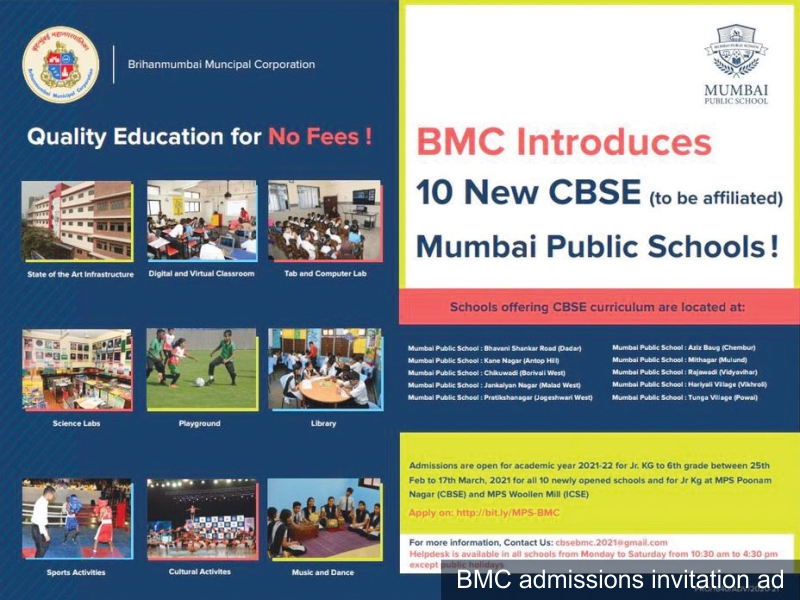
Dipta Joshi (Mumbai)
The Brihanmumbai Municipal Corporation (BMC) of Mumbai, India’s wealthiest local government with an annual budget of Rs.39,000 crore, is making final preparations to inaugurate ten free-of-charge KG-class XI schools affiliated with the Delhi-based Central Board of Secondary Education (CBSE) examination board.
Supervised by the Union education ministry but certified as autonomous, CBSE is the country’s largest pan-India school-leaving examinations (classes X and XII) board with 21,271 primary-secondaries in India and 200 overseas affiliated with it.
The board prescribes several stiff affiliation norms relating to curriculum implementation, teacher-pupil ratios, teacher qualifications, campus infrastructure etc. In addition to all Central government schools (Kendriya Vidyalayas, JNVs etc), over 16,000 highly reputed private unaided schools including DPS, R.K. Puram, Heritage Xperiential Learning School, Gurugram and SAI International, Bhubaneswar, routinely top-ranked in the annual EducationWorld India School Rankings (EWISR), are affiliated with this well-respected exams board.
Operational from the start of academic year 2021-22 (July) when preschools and primary classes are likely to commence, these CBSE schools are expected to revive and rejuvenate the image of the maximum city’s 1,200 BMC schools which have experienced a 50 percent drop in enrolment since 2008 because of poor quality education and learning outcomes.
Currently, 3.11 lakh children from low-income households are enrolled in BMC’s 1,200 K-X schools affiliated with the Maharashtra State Board of Secondary and Higher Secondary Education. They teach in (semi) English besides seven vernacular languages — Marathi, Hindi, Urdu, Kannada, Tamil, Telugu and Gujarati. Children are supplied with 27 essential educational items including books, bags, stationery, uniforms, a mid-day meal and even electronic tablets (for secondary students) free-of-charge.
However, despite this shower of freebies, BMC schools have been experiencing a steady exodus of students fleeing to Mumbai’s estimated 200 affordable budget private schools (BPS). Between 2008-18, 229 of BMC’s vernacular language schools were shut down because of zero student enrolment. Lack of teacher accountability, poor learning outcomes as well as growing parental aspiration for English as the medium of instruction, are among the reasons for students even from bottom-of-pyramid households forsaking free-of-charge BMC schools to fees-levying private BPS.
BMC officials entertain high hopes that its new CBSE-affiliated English medium schools offering excellent infrastructure, digital and virtual classrooms, tabs and computer labs, science labs, playgrounds and libraries for which the corporation has budgeted capital expenditure of Rs.14 crore in its 2020-21 budget, will stem the exodus and prove attractive to lower, middle and working-class parents.
“It is a welcome initiative to provide students from low-income families K-12 education on a par with private schools. It might also attract lower middle-class families, especially those who have suffered business loss and pay cuts during the Covid-19 pandemic. But over the past several decades, the reputation of BMC schools has become so poor that it’s likely even low-income households will prefer to pay for quality education than sign up their children in free-of-charge BMC schools. Therefore, parents who can afford to do so will prefer to wait and watch before enrolling their children in BMC-CBSE schools and even those who sign up, will switch to private schools unless the quality of education is as good as is being promised,” says Jayant Jain, president, Forum for Fairness in Education.
This scepticism isn’t unfounded. In 2019, 25 BMC schools were to be affiliated with a newly-founded Maharashtra International Education Board (MIEB) launched with great fanfare by the then ruling Bharatiya Janata Party (BJP)-Shiv Sena (SS) state government. Though appreciated by participating schools, no sooner had the current tri-party Maharashtra Vikas Aghadi (MVA) government replaced the earlier BJP-SS regime in November 2019, then the MIEB board was promptly dissolved.